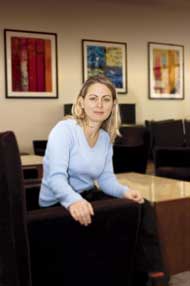Post Date: January 26, 2006
The following article was published in the January issue of Harvard Law Today.
By Elaine McArdle
It’s been only a few minutes since Pranvera Recica LL.M. ’06 finished her corporations exam, and she suddenly realizes she’s exhausted. Collapsing onto a chair at the Hark on a December afternoon, she explains that she’s had no more than two to three hours of sleep each of the past few nights, and she’s looking forward to getting back to her dorm room for a nap.
“Friends told me that corporations law was easy,” she said, sighing. Easy, perhaps, if you weren’t born and raised in Kosovo, where the socialist economy collapsed completely in the 1990s, during the military conflict between Serbians and Kosovar Albanians that resulted in at least 2,000 deaths and the displacement of 90 percent of the population. “For me, I’m seeing all of this [market economics] for the first time,” said Recica. “You learn about things you’ve only seen in the movies. I’m trying to figure out exactly what does it all mean.”
For Recica, the opportunity to study for a year at HLS is about more than broadening her perspectives, both legal and cultural. When she received her first law degree at the University of Prishtina in 1995, in the capital of Kosovo, she—like other non-Serbian Kosovar lawyers—was not allowed to take the bar exam and practice law. As part of its efforts in ethnic cleansing, the Serbian government had closed the Kosovar education system several years earlier, and the parallel system set up by Kosovar Albanians was not officially recognized. “I wanted to continue my education,” she said. “I wanted to see how it is to go to school in normal circumstances.”
Even though life in violence-torn Kosovo in the mid-1990s was anything but normal, Recica says that gradually people became accustomed to the hardships and even developed a heightened sense of impending danger. “You can just feel it in the air,” she said. “It’s strange. I can’t explain it.”
One winter night in early 1998, she stepped out of her office after a long day of work. “There was an incredible silence in the city,” she said. “I just felt something terrible had happened. People were walking in silence.” After a few minutes, she ran into a friend who told her that a family of more than 30 people had been slaughtered by Serbians in a town that wasn’t even particularly near Prishtina. “But everybody had heard about it. It’s like a sadness that comes over the city.”
Because the country’s restrictions prevented her from putting her legal skills to work, Recica turned her talents to other projects to help her community. She worked for more than six years for Oxfam on human rights initiatives, including efforts to empower women and provide them with education. “Our society is a mixture of the West and the East,” she said. “As a Socialist country, we had rights as women, but a lot of them were not instituted because of embedded cultural issues.” She also worked with displaced persons and in other humanitarian relief efforts before being deported to Macedonia by the Serbian government in 1999. There, she continued her work: “I was a refugee, working in a refugee camp.”
When she returned home following the 1999 peace accord, she was named director of the Kosovo Women’s Initiative, another empowerment project managed by Oxfam that focused on issues like job creation and preventing violence against women.
Over the next few years, Recica worked on several other development projects with Oxfam, the National Democratic Institute in Washington, D.C., and the U.S. Agency for International Development. Her position at USAID was the first opportunity to put her legal education to direct use. For three years, she managed a broad-based program on legal reforms supported by the National Center for State Courts and the American Bar Association’s Central Eastern European and Eurasian Law Initiative.
Her group was starting from scratch in setting up a functional legal system that would be accepted by the community. The plan called for establishing an independent judiciary that would give more authority to local courts than the former, highly centralized system had allowed. They also set up training and case-management systems for judges, created a continuing legal education program, and reestablished a bar examination, a code of legal ethics, a legal disciplinary board and a criminal law code.
“Everyone there had to be involved in important things,” she explained. “That is what you do in the development of post-conflict countries. If something changes, at least you know you contributed. If nothing changes, at least you know you did your best.”
At HLS, Recica is combining business-related and human rights courses, both of which figure into her plans to eventually return to her family in Kosovo—her father is a lawyer, too—and help her homeland develop. While she’s enjoying her studies very much, some aspects of life at HLS require adjustment, including the Socratic method. But the biggest challenge, she says, is the sugar- and salt-laden American food. “At home we have Mediterranean cuisine, with vegetables, and very plain,” she said. So what does she eat at the Hark?
“Soup,” she said, laughing.
For now, she’s focused on her remaining final exam and papers. She smiles again. “I just need to get some sleep.”
